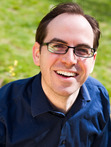Adam Szymkowicz's Blog, page 16
November 29, 2018
UPCOMING PRODUCTIONS OF MY PLAYS
PRODUCTIONS
WORLD PREMIERE
Stockholm Syndrome
or Remember That Time Jimmy's All American Beefsteak Place Was Taken Over By That Group Of Radicals?
Production #1 of Stockholm Syndrome
The NOLA Project
New Orleans, LA
Opens January 2019.
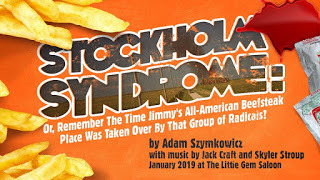
MORE SHOWS
KODACHROME
Production #7 of Kodachrome
Fire Exit Theatre
Alberta, Canada
Opens November 28, 2018.
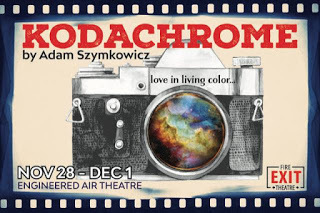
Production #8 of Kodachrome
Actors Bridge Ensemble
Nashville, TN
Opens July 12, 2019.
Marian or The True Tale of Robin Hood
Production #15 of Marian
Green Bay West High
Green Bay, Wisconsin
Opens November 29, 2018.
Production #16 of Marian
Theatre Conspiracy
Fort Myers, FL
Opens Feb 7, 2019.
Production #17 of Marian
University of North Carolina
Wilmington, NC
Opens February 21, 2019.
Production #18 of Marian
Shakespeare Performance Troupe
Bryn Mawr College
Bryn Mawr, PA.
Production #19 of Marian
Regis College
Weston, MA
Opens April 11, 2019.
Incendiary
Production #3 of Incendiary
Farmington Valley Stage Company
Collinsville, CT
Opens January 25, 2019.
7 Ways To Say I Love You
a night of short plays
Production #26 of 7 Ways
Auburn Community Players
Fiskdale, MA
Opens July 12, 2019.
Hearts Like Fists
Production #41 of HLF
Cyrano's Theatre Company
Anchorage, AK
Opens Sept 19, 2019
---------------------------------------------------------------------------------------------------------
Enter Your Email To Have New Blog Posts Sent To You
-----------------------------------------------------------------------------------------------------------
Support The Blog

-----------------------------------------------------------------------------------------------------------
Mailing list to be invited to Adam's events
Email:
------------------------------------------------------------------------------------------------------------
Adam's Patreon
Adam's New Play Exchange Profile (Plays to Read)
Books by Adam (Amazon)
@page { margin: 0.79in }
p { margin-bottom: 0.08in; direction: ltr; color: #000000; text-align: left; orphans: 2; widows: 2 }
p.western { font-family: "Times New Roman", serif; font-size: 10pt; so-language: en-US }
p.cjk { font-family: "Times New Roman"; font-size: 10pt; so-language: zh-CN }
p.ctl { font-family: "Times New Roman"; font-size: 10pt; so-language: ar-SA }
a:visited { color: #000000; text-decoration: none }
a.western:visited { so-language: en-US }
a.cjk:visited { so-language: zh-CN }
a.ctl:visited { so-language: hi-IN }
a:link { color: #000000; text-decoration: none }







WORLD PREMIERE
Stockholm Syndrome
or Remember That Time Jimmy's All American Beefsteak Place Was Taken Over By That Group Of Radicals?
Production #1 of Stockholm Syndrome
The NOLA Project
New Orleans, LA
Opens January 2019.

MORE SHOWS
KODACHROME
Production #7 of Kodachrome
Fire Exit Theatre
Alberta, Canada
Opens November 28, 2018.

Production #8 of Kodachrome
Actors Bridge Ensemble
Nashville, TN
Opens July 12, 2019.
Marian or The True Tale of Robin Hood
Production #15 of Marian
Green Bay West High
Green Bay, Wisconsin
Opens November 29, 2018.
Production #16 of Marian
Theatre Conspiracy
Fort Myers, FL
Opens Feb 7, 2019.
Production #17 of Marian
University of North Carolina
Wilmington, NC
Opens February 21, 2019.
Production #18 of Marian
Shakespeare Performance Troupe
Bryn Mawr College
Bryn Mawr, PA.
Production #19 of Marian
Regis College
Weston, MA
Opens April 11, 2019.
Incendiary
Production #3 of Incendiary
Farmington Valley Stage Company
Collinsville, CT
Opens January 25, 2019.
7 Ways To Say I Love You
a night of short plays
Production #26 of 7 Ways
Auburn Community Players
Fiskdale, MA
Opens July 12, 2019.
Hearts Like Fists
Production #41 of HLF
Cyrano's Theatre Company
Anchorage, AK
Opens Sept 19, 2019
---------------------------------------------------------------------------------------------------------
Enter Your Email To Have New Blog Posts Sent To You
-----------------------------------------------------------------------------------------------------------
Support The Blog

-----------------------------------------------------------------------------------------------------------
Mailing list to be invited to Adam's events
Email:
------------------------------------------------------------------------------------------------------------
Adam's Patreon
Adam's New Play Exchange Profile (Plays to Read)
Books by Adam (Amazon)
@page { margin: 0.79in }
p { margin-bottom: 0.08in; direction: ltr; color: #000000; text-align: left; orphans: 2; widows: 2 }
p.western { font-family: "Times New Roman", serif; font-size: 10pt; so-language: en-US }
p.cjk { font-family: "Times New Roman"; font-size: 10pt; so-language: zh-CN }
p.ctl { font-family: "Times New Roman"; font-size: 10pt; so-language: ar-SA }
a:visited { color: #000000; text-decoration: none }
a.western:visited { so-language: en-US }
a.cjk:visited { so-language: zh-CN }
a.ctl:visited { so-language: hi-IN }
a:link { color: #000000; text-decoration: none }







Published on November 29, 2018 07:39
November 27, 2018
I Interview Playwrights Part 1018: Ren Dara Santiago
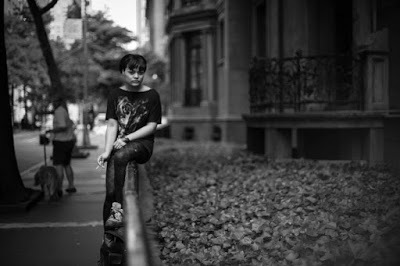
Ren Dara Santiago
Hometown: I was born in the Bronx, lived in Puerto Rico for the first year of my life. Then Yonkers. We moved to Harlem in 2002.
Current Town: Harlem. I am re-experiencing it now with my roommates: one a devout James Baldwin-head, Alexander Lambie and the other is my future president, Cesar J Rosado who buys me bacalaito on 116. They’re both gorgeous actors I came up with.
Q: Congrats on winning the Cornelia Street American Playwriting Award. Can you tell me about that?
A: Absolutely. It’s a huge honor. I haven’t fully realized the scope of it, I’m sure. I can’t say enough about the depth of love, confidence, and trust I feel being bestowed upon me as the inaugural recipient of this award from Rising Phoenix Rep, honoring the spirit and legacy of Joe Cino. So, one of the members who chose me for this award is Daniel. I met Daniel as a teenager. Lucy was like, “my brother saw your play,” and I was like, “oh shit.” He’d come to see a workshop production of COME TO STARR STREET and it excited him. His confidence gives me faith in myself. Then I acted in a play written by Catya McMullen for Cino Nights, directed by Jenna Worsham. And he gave me and a few fam a Shakespeare workshop at Belvedere Castle. Then he directed the shit out of The Siblings Play in PlayLabs at MCC. He let me rewrite the play twice that week. And the Talbott’s put me up when I got in to Ojai Playwrights Conference. He and Addie have become these beautiful guides for truth and love in the theater. It’s an honor that they chose me. I’m burning with the desire to live up to this legacy and uphold the honor and integrity that the members of Rising Phoenix Rep holistically embody in all facets of themselves. There’s going to be a ceremony in February at Rattlestick. At Rattlestick; where Daniel was mentored by David Van Asselt; who asked Lucy to start an apprentice company; who invited a handful of her former MCC Youth Company students into and we called it The Middle Voice; that’s our family home. I am in awe of how romantic my life is at this moment. I am in awe of the people surrounding me and I can’t wait for us to rise together, building each other up. I recognize the ways in which I am continually lifted and I live to pay that forward and make my theater family proud.
Q: What are you working on now?
A: My Rising Phoenix Rep membership was just announced so I’m pretty hype. I’m excited for their co-pro of Jessica Dickey’s Play: The Convent coming to A.R.T/ New York Theatres. I have one or two more meetings with Playgrounds at the Lark where I’m workshopping the fantasy scenes for an educational-theater piece. I’m heading to the Eugene O’Neill Theater Center for Playwrights & Librettists at NTI and I get to do a lil exercise with them for the weekend. I’m in Middle Voice at Rattlestick and we have an exciting new theater artist running the program but until that really gets running we’ve got some development hours and I’m just feenin to stretch those producer muscles and cast some members in some plays I been reading; like I want some of my boys to tear up We Are Proud to Present A Presentation About the Herero of Namibia, Formerly Known as Southwest Africa, from the German Sudwestafrika, Between the Years 1884-1915 so we can have some Baldwin-style discussions. I may use some hours to hear a rewrite of my play Something in the Balete Tree before Gingold Theatrical Group sets up a reading for me in the new year. I am applying to some grad programs for Playwriting which are due very soon and please cross your fingers for me because my spirit has never demanded a prize like this education. Whattup Yale?!
Q: Tell me, if you will, a story from your childhood that explains who you are as a writer or as a person.
A: So there's two parts of me that are married when I write; the spiritual and the inherited. I saw God as a kid once. My father was Rasta; he actually hung out with some Bobo Shanti in Yonkers but he couldn’t officially join them. So, God wasn’t an untouchable existence to me. When I told my grandma about my dream all my titi’s made a big deal out of it. They weren’t surprised he came to me. Later, I’d start seeing demons. Before writing the play Daniel came to see, I’d seen the devil a few times in my dreams and we began forging a deal for my soul. That play was my way out of our contract. And that’s just part of my understanding of the world... I put all that impossible shit into my plays and it helps guide me through the conversations I want to have with the people coming into my spaces. I’ve always lived in sort of adjacent realities. Like, my parents are people that don’t exist anywhere else, even within their families and I’m a product of that and in a lot of ways we grew up together. My mother is a Filipina who emigrated at 2; who dodged her inheritance to pursue a career in fashion; who didn’t marry who they expected her to; who accepted that scorn to be with my father and give birth to me and my siblings. My father is a second generation Boricua. He grew up in Cali, a total surfer brah and came to Brooklyn with an orange Mohawk talking about Dub when everybody and they mother was rocking to Big Daddy Kane and the like. My dad is a self-educated scholar. He had me read A People’s History in middle school. I grew up on indies and Japanese anime’s and ska, dub, roots reggae, System of a Down, and goth. Miyazaki’s worlds are over-layed onto my perception of nature and industry. Yeah. They never told me how to look at the world. They told me how to look at each other. Yeah. Neither of my parents fit. Anywhere. They stood out. They were loved but they didn’t fit. I found a place where I fit and where I could fulfill my potential. And my potential is making at least one difference in this short time we have. That’s kind of why I am who I am.
Q: If you could change one thing about theater, what would it be?
A: Laziness. I see a lot of laziness. It’s in the tiny things sometimes- not casting in honor of heritage or it’s big like letting a draft that’s mainly diary, not dialogue, make it all the way to production. The worst is laziness in watching a play. That’s the worst. How dare you praise a smart-but-easy play and scorn the ones with all the heart and soul? That might be talking about people you never met or experiences you’ve never had. Why did you come to the theater? Watching the theater should inspire community.
Q: Who are or were your theatrical heroes?
A: Lucy Thurber is my hero. She’s a warrior. She’s the best teacher I’ve ever had and she loves doing it in this way that you can only experience to understand. Her plays are these endless black holes filled with her love and her brain and I love that woman. Jenna Worsham just never stops. She’s my best friend and nobody can stop her from fighting for social justice fucking everywhere she goes. Adam Bock is a genius and the funniest, kindest person I’ve ever met. And every play blows my mind. Daniel Talbott is a triple threat? Quadruple threat AND an amazing dad. And I’m in love with his characters- like I’m haunted by all of his characters. Addie Talbott is a queen and I want to be as brave, smart, and badass and genuine as her. Sam Soule is an epic Greek titan in the form a petite human. David Zheng and Cesar J Rosado are my brothers and my pride and joy. Rachel Jett running things at NTI like the boss she is. Those are the OG’s. This month I am in love with Ngozi Anyanwu, Alexander Lambie, Jordana De La Cruz, Christopher Gabriel Nunez, Julissa Contreras, Jeremy O Harris, Erika Dickerson-Despenza, TJ Weaver, Robert Lee Leng, Guadalis Del Carmen... I am forgetting some. I’m sorry. That’s just this week having me so grateful for their work.
Q: What kind of theater excites you?
A: Brave, unapologetic, heart-open, thoughtful, critical, deeply explored, wild, funny, real shit.
Q: What advice do you have for playwrights just starting out?
A: Remember who you are writing for, so you can keep going. Write as much as you see and read. Talk to the collaborators you like, and spend a lot of time listening and learning from and trusting what you have to offer. That when you’re just getting to know artists the best way to get love is to give it freely first. That’s not a recipe that’s a religion. Save everything to the cloud or wherever before you move from where you are writing in case you spill or drop your shit and lose that draft.
Q: Plugs, please:
A:
https://www.rattlestick.org/middlevoice/
https://www.risingphoenixrep.org
https://gingoldgroup.org/speakers-corner-new-works/
---------------------------------------------------------------------------------------------------------
Enter Your Email To Have New Blog Posts Sent To You
-----------------------------------------------------------------------------------------------------------
Support The Blog

-----------------------------------------------------------------------------------------------------------
Mailing list to be invited to Adam's events
Email:
------------------------------------------------------------------------------------------------------------
Adam's Patreon
Adam's New Play Exchange Profile (Plays to Read)
Books by Adam (Amazon)







Published on November 27, 2018 06:32
November 14, 2018
I Interview Playwrights Part 1017: Aladdin Ullah
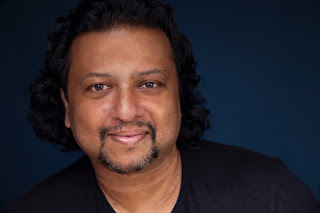
Aladdin Ullah
Hometown: New York City
Current Town: New York City
Q: Tell me about Dishwasher Dreams.
A: It was developed at the Public Theater while I was a member of the Inaugural Emerging Writers Group. Man I really loved that group. Some super talented writers, talented artists were in that group- Ethan Lipton, Radha Blank, Raul Castillo and quite a few more. A little before that time, I was really frustrated about 15 years ago being a comedian. I was a bit burned out, comedy can be grueling. I was tired of the grind and constantly auditioning for stereotypical roles. So I saw Lackawaana Blues by Ruben Santiago Hudson and it was life altering. I cried in the lobby of the Public Theater because it was so moving, so real, I felt like a voyeur watching the humanity of that play along with the blues guitar scoring the scenes. Some solo shows are just a showcase for the actor with no story but Ruben had such a moving story. It inspired me to write my solo play Dishwasher Dreams with an amazing Tabla Player- Avi Sharma.
The play is about me preparing to audition for the role of a Muslim terrorist as I reminisce about my dad arriving from Bangladesh to land in Spanish Harlem during the 1940's in pursuit of the American Dream. I wanted to do something original with music that was both hilarious and moving. There weren't a lot of plays that addressed immigrants from the perspective of first generation and second generation clashing, as well as addressing various themes. I think this play is a very original play. I'm trying to show the authentic voice of immigrants that are Muslim along with their children like myself who grew up right in the thick of hip hop during the late 70's and 80's. I think people have one view of Muslims. I'd like to write plays that show audiences we are more than just the cliche of caricatures you see everyday. There are folks who grew up in Muslim households that are not the stereotype, there are muslims who rebel, are defiant, some smoke weed, some practice the religion, some do not , but most of all we are human. Sometimes people forget that. I'm trying to just write stories that bring that truth, that diversity to the stage and screen with nuance. There is very anti-immigrant sentiment right now. It's actually nothing new because racism is American as apple pie. Arts is a great weapon to combat that-- especially comedy. The theater is best place to tell the truth, that kind of captivating experience is what makes me fall in love with live performance.
Q: What else are you working on now?
A: I'm hoping to finish my next play Halal Brothers about two brothers from Bangladesh that own a Halal store in Harlem with events taking place the day of Malcolm X's assassination in 1965. I wrote it really for Aasif Manvi who is brilliant. I'm also working on finishing editing my documentary in Search of Bengali Harlem. It's about the first wave of Bengali Muslims that arrived in Harlem from 1880's to present day.
Q: Tell me, if you will, a story from your childhood that explains who you are as a writer or as a person.
A: When I was a little kid I lived in the projects and never thought writers existed. I read a book called Down These Mean Streets by Piri Thomas. That book took place on my block on 104th street. I was fascinated that anyone who wrote about my neighborhood. When I read this book he created a vivid picture of places I walked in daily. I couldn't believe that you could write about where you lived. I was 11 years old and inspired to write. I attended the boys's club on 111th street and as fate would have it the photography teacher there knew Piri Thomas. I told him I wrote a few short stories. So he took me out to Piri Thomas' house by Grand Army Plaza in Brooklyn to meet him. I was about 11 years old. I was a bit starstruck by Piri Thomas as I loved that book. It was a bit overwhelming as all these adults were there. Later in the night people were playing congas and they were reciting poetry. Piri Thomas told me to get up and read one of my stories. I kept nodding my head saying, "no, no, no!" Piri told me he would read one piece and he would be next to me and persuaded me to read my short. Piri said his piece and then I took a deep breath and read my short piece as my knees were shaking. It was about me looking out my window on 104th and Park Avenue wondering where the metro north trains were going. Were they going to a place where people didn't have to walk up 15 flights when the elevator broke? Or was it a place where people were going to get chocolate like in willa wonka world and on on and on. After I finished people were cheering and Piri bear hugged me. Not only did writng captivate me but I got the satisfying feeling of what live performance was like at age 11. Maybe that day a solo performer was born.
Q: If you could change one thing about theater, what would it be?
A: Wished Playwrights of color who don't have many grants or obies, or tonys could get a fair share of being produced and not shut out of the conversation. Bureaucracy is what I'd love to change. The politics of this hustle of being produced is what I wish we could change. It's a damn shame how politics play a huge part in how one gets produced but in the land of the blind the one eyed man is king. It sure would be nice if it were a level playing field. So if you don't come from a fancy MFA program they look at you like they are watching paint dry. That is a conversation that could take days to discuss so I'll leave it there.
Q: Who are or were your theatrical heroes?
A: August Wilson. Ruben Santiago Hudson, Eugene O'Neil, Arthur Miller. David Henry Hwang, Liesl Tommy, Dominique Morriseau, Lynn Nottage, Stephen Adly Guirguis.
Q: What kind of theater excites you?
A: The kind that moves you. I could watch August Wilson plays nonstop. I really like new playwrights that challenge the status quo that really show you the humanity of folks people ignore. There is nothing more exhilarating than creating theater, art that challenges audiences to think, to look out of a window they are not looking out of. I love plays that put on the gloves and punch audiences in the gut with truth, the way a boxer fights in the ring. Theater possesses the potential to tell the truth. Playwrights from Odetts to Beckett, from O'Neill to August Wilson, from David Henry Hwang to Dominique Morriseau. Each bring a no BS authenticity to the stage and make audiences see the injustice as they root for the underdog. That's the kind of theater I want to be a part of. You can keep your BS theater for tourists on Broadway, I want theater that rocks peoples world, that challenges them to hear voices from people that have been marginalized. That's what I'm talking about. I love that. That's the theater that NEEDS to be seen.
Q: What advice do you have for playwrights just starting out?
A: Writing is rewriting so keep writing. Find a place where you can develop find actors that you trust, create your own space and don't wait for any theater, or artistic director to validate you. Keep it moving keep it busy, stay inspired, write stories that resonate with your heart and keep getting up when you fall, rejection is not the end of the world if you love it embrace it and enjoy the f-g journey!
Q: Plugs, please:
A: Dishwasher Dreams
written and directed by:
Aladdin Ullah
Tabla accompaniment-Avi Sharma
Directed by Gabriel Vega Weissman
543 W 42nd Street
Playing till Nov. 18th.
more info:
http://www.dishwasherdreams.com/?fbclid=IwAR1xlnttrR6a3VVi1wjZ-hKNe_iRodCwvwzKkO1eIGdnfjsRgVN7dfpPi2g
---------------------------------------------------------------------------------------------------------
Enter Your Email To Have New Blog Posts Sent To You
-----------------------------------------------------------------------------------------------------------
Support The Blog

-----------------------------------------------------------------------------------------------------------
Mailing list to be invited to Adam's events
Email:
------------------------------------------------------------------------------------------------------------
Adam's Patreon
Adam's New Play Exchange Profile (Plays to Read)
Books by Adam (Amazon)







Published on November 14, 2018 09:35
November 8, 2018
I Interview Playwrights Part 1016: Tyler English-Beckwith
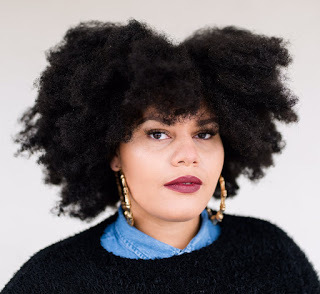
Tyler English-Beckwith
Hometown: Dallas, Texas
Current Town: Brooklyn, NY
Q: What are you working on now?
A: Currently working on the first draft of a new play called Young Mammy, and working on a project with Meow Wolf out of Santa Fe, NM.
Q: Tell me, if you will, a story from your childhood that explains who you are as a writer or as a person.
A: At my pre-school graduation, I was allowed to walk across the stage to celebrate my matriculation from the 3 year old class into the 4 year old class. I got my certificate and sat back down, but then I saw that the 5 year olds who were going to kindergarten got to give one-line speeches. I left my mother's side and demanded that the microphone be passed to me. I gave a speech that was much longer than the other speeches that were actually on the program. Then I bowed and got a standing ovation. When my mom tells the story she says that it was all gibberish, but I was very intentional with what I had to say. It was urgent to me. Whatever I said needed to be said immediately. In front of an audience.
Q: If you could change one thing about theater, what would it be?
A: Critics should be practitioners.
Q: Who are or were your theatrical heroes?
A: Since she passed, I've been thinking about Ntozake Shange every day and the ways that she sacrificed her body. Also Karen Cogdill, Elly Lindsay, and Vickie Washington, my former teachers from Booker T. Washington High School for the Performing and Visual Arts. They laid the foundation for everything I've learned.
Q: What kind of theater excites you?
A: Theater that tells a truth you know but are afraid to speak out loud.
Q: What advice do you have for playwrights just starting out?
A: I always think of this Octavia Butler nugget of truth. "First forget inspiration. Habit is more dependable. Habit will sustain you whether you're inspired or not. Habit will help you finish and polish your stories. Inspiration won't. Habit is persistence in practice.
Q: Plugs, please
A: I can be found on New Play Exchange.
---------------------------------------------------------------------------------------------------------
Enter Your Email To Have New Blog Posts Sent To You
-----------------------------------------------------------------------------------------------------------
Support The Blog

-----------------------------------------------------------------------------------------------------------
Mailing list to be invited to Adam's events
Email:
------------------------------------------------------------------------------------------------------------
Adam's Patreon
Adam's New Play Exchange Profile (Plays to Read)
Books by Adam (Amazon)







Published on November 08, 2018 07:00
November 7, 2018
I Interview Playwrights Part 1015: Rachel Bublitz
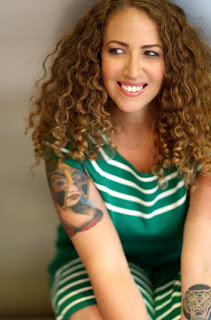
Rachel Bublitz
Hometown: San Diego, California
Current Town: Salt Lake City, Utah
Q: What are you working on now?
A: Right now I'm working on a play commissioned by the Egyptian Youtheatre about the first women to fly combat missions called Night Witches. They flew planes for Russia during World War 2 and were named the Night Witches by the Germans. Their planes were made out of wood and canvas, mostly, they flew every fifteen minutes at night, to keep the Germans from sleeping, and they'd often cut their engines before dropping their bombs so they wouldn't be heard by their enemy. A lot of them were under twenty years old, and since I think there's a lack of exciting TYA material out there, especially with great roles for young women, I think it's a perfect fit for high school and youth theaters. My ultimate plan is to have a triptych of historical plays about women set during WW 2, the first of which I've already written, about a spy named Nancy Wake (Once A Spy). Night Witches has me stepping outside of my comfort zone a lot, it incorporates a lot of movement and lyrical choral elements, which is both exciting and really terrifying... Like all good things!
Q: Tell me about 31 plays in 31 days.
A: After I wrote my first full-length play I realized that I had a lot of learning to do if I was going to do this as a profession. I thrive on crazy challenges and so I decided to write a play a day during the month of August (when my kids would both be in pre-school for the first time). I mentioned this to a playwright pal of mine, Tracy Held Potter, and she insisted that we make it a big thing and invite playwrights from around the world to join us. I thought she was totally crazy, I honestly didn't think anyone else would want to do it. And I was so, so wrong! 31 Plays in 31 Days has been going strong for SEVEN years now, and it still amazes me how many playwrights from all over the world still take on this huge challenge each year. It's now being run by the phenomenal Topher Cusumano who uses all his energize to excite hundreds and hundreds of playwrights to join him in this annual undertaking.
And, by the way, it worked for me. I haven't participated each year, but every time I do it stretches and pushes me as a writer and really strengthens my craft. I love it.
Q: Tell me, if you will, a story from your childhood that explains who you are as a writer or as a person.
A: This is kinda silly but I think it's mostly because I was alone a lot as a kid. I was a latch-key kid, and between school and when my mom got off I fended for myself. This typically took the form of my playing board games by myself, creating different characters who played against one another, playing tons of solitaire, since I'd assigned characteristics and back stories to all the face cards, so that each game involved a pretty epic fantasy to go along with how the cards fell, and tons of reading. My dad lived far away and sent strange books constantly. I read King Lear in sixth grade and loved it, but he also sent Grendel, In Watermelon Sugar, and lots and lots of Vonnegut.
Q: Who are or were your theatrical heroes?
A: Paula Vogel, Lynn Nottage, Marsha Norman, Quiara Alegría Hudes, Lorraine Hansbury, Dominique Morisseau, Anna Deavere Smith, Pam Gems, and Susan Glaspell, to name a few.
Q: What kind of theater excites you?
A: I like theater that makes me laugh and cry, that puts me in another person's shoes, that pushes and makes me question my own values. I like messy and complicated characters and stories that don't have easy (or any) answers. I think right now we're all being shoved so hard into separate and very specific boxes, I'm most excited about theater that takes people out of those box and reminds us that above everything else we're all human.
Q: What advice do you have for playwrights just starting out?
A: Read and write a lot. See lots of theater, even bad theater, maybe especially bad theater... It helps you develop your own taste and you can start the fun experiment of how you'd fix it (after you've left the show, of course!). Read for a theater, I read for Berkeley Rep for a few years, I earned free tickets and had tons of brand new plays at my finger tips. Let your writing be bad, trust in your craft and in process, we draft for a reason. I'm not a write-every-day type, but I do think structure is key. To writing and writing habits. Oh, and read, read, read!! Get on New Play Exchange, it's the best investment EVER for anyone interested in new plays. And after you put up some of your work, read plays from other playwrights.
Q: Plugs, please:
A: I've been lucky enough this year to have at least one public performance in every month! Happening right now in November I have two plays in the Utah New Works Festival, Employee of the Month as a full production, and The Garden as a reading. My play Mom's Ham will also be produced in San Diego with Clairemont Act One Community Theater.
In December I have a workshop of Mom's Ham with Phoenix Theatre Ensemble and a developmental reading of my play Ripped with Athena Theatre, both in New York City.
And I have tons of work up on my New Play Exchange page here: https://newplayexchange.org/users/275/rachel-bublitz
And my website: https://rachelbublitz.com/
Also, in case any of your readers teach high school or college and are looking for material, I have another TYA play that I'm looking for a second production of right now, a super fun and glittery full length called Cheerleaders VS. Aliens, which is up on my New Play Exchange page.
---------------------------------------------------------------------------------------------------------
Enter Your Email To Have New Blog Posts Sent To You
-----------------------------------------------------------------------------------------------------------
Support The Blog

-----------------------------------------------------------------------------------------------------------
Mailing list to be invited to Adam's events
Email:
------------------------------------------------------------------------------------------------------------
Adam's Patreon
Adam's New Play Exchange Profile (Plays to Read)
Books by Adam (Amazon)







Published on November 07, 2018 07:00
November 6, 2018
I Interview Playwrights Part 1014: Danielle Deadwyler
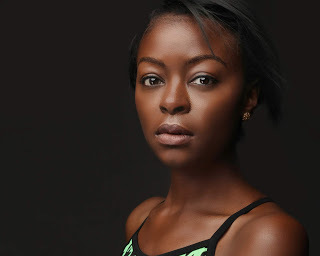
Danielle Deadwyler
Hometown: Atlanta, GA
Current Town: Atlanta, GA
Q: What are you working on now?
A: Auditioning and revising/editing a collection of poems.
Q: Tell me, if you will, a story from your childhood that explains who you are as a writer or as a person.
A: I have few stories from childhood that I’m able to automatically remember these days. I’m making it all up as I go. I gather that’s why fragmentation is so engaging to me, compositions that are more interested in moments (and memory) than a long-winding-road-form of writing. How do many moments speak for a whole? This is what I seek to get to the heart of as a writer, art maker.
Q: If you could change one thing about theater, what would it be?
A: The funding!!! And more time to build in/work the process. We’ve lost the developmental (rehearsal) time for work. It has shrunken since I began professionally, which my mentors say had been shortened for them. From four to three to two weeks sometimes. Allowing marination truly yields a more flavorful, rich meal.
Q: Who are or were your theatrical heroes?
A: Donald Griffin, Crystal Fox, Andrea Frye, Jasmine Guy, Ntozake Shange, that I can think of now. Most of these folks I could touch. They actually pore into me. Our heroes are closer than we think.
Q: What kind of theater excites you?
A: Raw. Honest. Surprising. Theatre that pushes humanity in both directions on the spectrum. I love work that fills the space and shrinks it simultaneously. I love to feel a part of a world.
Q: What advice do you have for playwrights just starting out?
A: Listen carefully. Quietude is valuable in a sensorially busy world. Writers are like spiritual healers/leaders...we have to be hyper-aware of the world’s happenings (well read) and adult to be synthesizers of such experiences. And more questions than answers.
Q: Plugs, please:
A: I’m actually in a film currently playing the west coast, JANE & EMMA. Other things are pending, so mums the zipped lips.
---------------------------------------------------------------------------------------------------------
Enter Your Email To Have New Blog Posts Sent To You
-----------------------------------------------------------------------------------------------------------
Support The Blog

-----------------------------------------------------------------------------------------------------------
Mailing list to be invited to Adam's events
Email:
------------------------------------------------------------------------------------------------------------
Adam's Patreon
Adam's New Play Exchange Profile (Plays to Read)
Books by Adam (Amazon)







Published on November 06, 2018 07:35
November 5, 2018
I Interview Playwrights Part 1013: Hank Kimmel
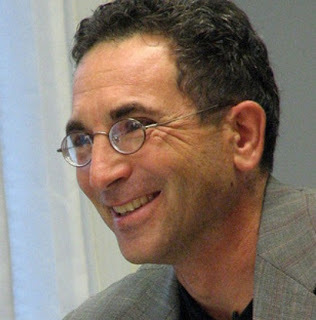
Hank Kimmel
Hometowns: Pittsburgh, PA; Sands Point, NY; Lakeville, CT
Current town: Atlanta, GA
Q: What are you working on now?
A: I am working on writing honorably, where, as a playwright, I am there to serve the characters rather than the other way around. I want to make sure my characters have the ability to charm, even those whose external circumstances may make them un-likable. (I often write about distressed lawyers, former athletes, and religious strays.) I also continue to work on making sure that all my characters have some kind of driving “want,” something they’re either going to get (or not) by the end of the play. I know this is basic, but within the trappings of theme and purpose, I find it’s easy to lose sight of this.
More tangibly, I am working on Confessions of A Hit Man, a first reunion of two ex-football players 15 years after one permanently paralyzed the other in an otherwise meaningless game. I received a Reiser Lab grant from the Alliance Theatre in Atlanta to develop this play, and my team (Eric Little, Tisha Whitaker, Daphne Mintz, Kathi Frankel) and I have a showcase reading in December. I am also working on developing salon type readings that are meant to be shared in non-traditional theatre settings. My colleague Mira Hirsch and I have lined up our first gig, Hank Kimmel’s Holiday Shorts, at Kitchen Six Restaurant in early December.
Q: Tell me, if you will, a story from your childhood that explains who you are as a writer or as a person.
A: When I was at sleepaway camp, one of the campers was having a miserable summer. Our counselor, Mark Antonucci, a most generous and gracious person, asked me and my bunkmates if we could make room in our cabin for this distraught camper. Our bunk, at least to us, already seemed crowded, and we said no. That answer still haunts me to this day. By being more flexible and open, we could have helped this camper rescue his summer. Instead we placed our convenience over his needs. As a result, to this day, I try to make my default answer “yes” to requests that might create momentary discomfort to me but that may become deeply meaningful to someone else. It’s part of the reason why I remain fully committed to the inclusive practices of Working Title Playwrights, an Atlanta-based theatre company dedicated to the development of playwrights and new work.
Q: If you could change one thing about theater, what would it be?
A: I would like to see more plays that challenge our basic assumptions of what we believe, and when I say “we,” I suppose I’m talking about the apparent monolith of beliefs help by those of us who practice theatre. When I first started in theatre, I was exposed to a play (by Karen Klami) that depicted the early life of Adolph Hitler, and his failures as an artist. As a person and Jew, I find nothing redeeming about Hitler, but the play, against my will, made me feel empathy for his shortcomings. This is why Amadeus is one of my favorite plays. I find myself loving Scaleri, who, on the surface, is someone I would naturally detest.
Q: Who are or were your theatrical heroes?
A:
Spalding Gray.
Gary Garrison.
Paula Vogel.
Q: What kind of theater excites you?
A: Ever since I saw the Broadway version of A Funny Thing Happened on the Way to The Forum as an eight-year-old, I love comedies and the chance to laugh. Even so, I am most drawn to plays that can make me cry, though I am a person who is not naturally drawn to tears. Most recently, I was brought to tears by A Band’s Visit and Dear Evan Hansen.
Q: What advice do you have for playwrights starting out?
A: Love the process, the results are incidental.
Be a playwright all the time. Think dramatically.
Become a part of a community. Those who give are also those who receive.
Consider Jonathan Winters quote: “If your ship doesn’t come in, swim out to it.”
Q: Plugs, please.
A: I currently serve as Board President of both Working Title Playwrights (www.workingtileplaywrights.com) and the Alliance for Jewish Theatre (www.alljewishtheatre.org) and I am always eager to embrace those who want to join our communities (or who want to help underwrite our wonderful programs!!!!)
My web site is www.hankkimmel.com
I can also be found on the New Play Exchange.
I also have a law practice that focuses exclusively on mediation, and I am always willing to help those who have some kind of dispute involving divorce, landlord-tenant issues, and non-profit management
---------------------------------------------------------------------------------------------------------
Enter Your Email To Have New Blog Posts Sent To You
-----------------------------------------------------------------------------------------------------------
Support The Blog

-----------------------------------------------------------------------------------------------------------
Mailing list to be invited to Adam's events
Email:
------------------------------------------------------------------------------------------------------------
Adam's Patreon
Adam's New Play Exchange Profile (Plays to Read)
Books by Adam (Amazon)







Published on November 05, 2018 07:34
November 2, 2018
I Interview Playwrights Part 1012: Annie Harrison Elliott
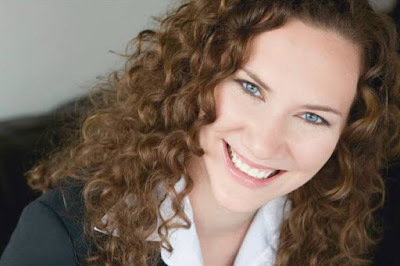
Annie Harrison Elliott
Hometown: Kennesaw, Georgia
Current Town: Atlanta, Georgia
Q: What are you working on now?
A: Many projects involving powerful women in unusual situations. Traditional plays include a thriller, The Handprint, inspired by one of my ancestors who was killed during the Molly Maguire trials in 1860’s-70’s America. Also on the docket is a modern day look at Hedda Gabler.
I’m co-writing or co-creating two projects. The first is an immersive Frankenstein with Found Stages Theatre. I’m working on the Mary Shelley character, which fits in well with my “powerful women in unusual situations” theme. The second is a dance theatre piece co-created by Amber Bradshaw and Danielle Deadwyler entitled Unknown Woman, which is about women who dressed as men in order to fight in the Civil War.
Writing for children is also a big interest, and something I plan to continue. I published my first children’s play this year, Math Problems, with YOUTHplays. I’m also working on my first TV project with a development company here in Atlanta, and I’m learning a lot about that industry, which is new and challenging.
Q: Tell me, if you will, a story from your childhood that explains who you are as a writer or as a person.
A: When I was a small child, I was easily scared. Swim class terrified me. Until one day I got tired of being scared and threw myself into the deep end of the pool-- to the shock of everyone around me.
I feel like my experiences as a writer are just me continuing to throw myself into the deep end of the pool and learning to swim as I go. To be honest, that’s what I prefer. I thrive by learning from experience.
Q: If you could change one thing about theater, what would it be?
A: Some theatre companies do a GREAT job at nourishing their artists and communities. But I do think theatre can easily breed toxic environments, and that’s something to always be aware of and question.
Q: Who are or were your theatrical heroes?
A: I’m impressed by people who are both talented and kind. I’m personally over the whole “tyrannical genius” trend we’ve had in the arts. I look for people as role models that represent an entirely new definition of “genius” than we’ve sometimes had in the past.
Q: What kind of theater excites you?
A: Plays that have their own unique structures. Plays with a unique voice I’ve never heard before.
Q: What advice do you have for playwrights just starting out?
A: Listen. Listen to other people. Listen to your own voice. Ask yourself tons of questions.
---------------------------------------------------------------------------------------------------------
Enter Your Email To Have New Blog Posts Sent To You
-----------------------------------------------------------------------------------------------------------
Support The Blog

-----------------------------------------------------------------------------------------------------------
Mailing list to be invited to Adam's events
Email:
------------------------------------------------------------------------------------------------------------
Adam's Patreon
Adam's New Play Exchange Profile (Plays to Read)
Books by Adam (Amazon)







Published on November 02, 2018 06:30
November 1, 2018
I Interview Playwrights Part 1011: Anna O'Donoghue
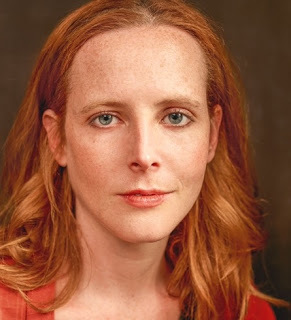
Anna O'Donoghue
Hometown: Brooklyn, NY. Then briefly Washington, D.C. Then the upper west side. Then Brooklyn a little more. Then Manhattan again. Very New Yorky.
Current Town: Harlem, NY. My bodega is better than your bodega.
Q: What are you working on now?
A: I am working on a play called Gap Years which is about two sisters who have just had some big life events -- the younger one just made it through cancer treatment (she's okay, we think), and the older has just gotten fired from her celebrity babysitting job (which is to say, she babysits for the children of celebrities, she's not like, a famous babysitter, that's not a thing) -- and take a trip to the Rwandan genocide memorials. Cause that's how the younger sister wants to celebrate remission. No one said she was psychologically healthy.
The play is an exploration of dark tourism, which is this industry based on people traveling to sites of horrible moments in human history. It's also more generally examining the ways we conceptualize and commodify trauma, both in our own self-narratives and in our larger historical ones. Particularly about the body and illness/abuse/disease. And what we talk about when we talk about pain.
I think it's about those things anyway, I'm like barely halfway through it so who knows. But that's what I'm researching/immersing in.
I am also working on some audio fiction/drama projects, cause isn't it nifty to talk to people from inside ear buds, aka speak to them from inside their own heads aka take over/become their thoughts? So fun. I'm collaborating with the very brilliant composer/sound designer Daniel Kluger on a piece called Offense about a woman who comes home from a bad date, cooks some squid, and then plucks out her own eye. So, you know, look out for that one. It's really inspirational and peppy.
Q: Tell me, if you will, a story from your childhood that explains who you are as a writer or as a person.
A: Oh god. Well I was an overachiever as a kid who would like, make up my own extra-credit projects for classes I was already getting A's in (I got that out of my system and am now Extremely lazy) so as an homage to that long-dead extra-credit seeker self, I will give you not one but TWO childhood episodes, pick one:
First. When I was about eight I used to play Shakespeare with my friend Lydia. What "playing Shakespeare" meant is that we would go into the backyard and improvise histrionic scenes that involved queens and deaths and mistaken identities and a lot of "forsooths." We didn't really know Shakespeare plots but we just kinda riffed on our general understanding of the tropes; when we felt the other one had done a particularly good showing of Shakespeareness we would award her with an Academy Award. I remember Lydia got one for a particularly spirited death in which her dying words were railing against her husband, who had been a "stuffed cabbage."
Lydia eventually got bored of this game. I tried to give her more Academy Awards to keep her interested but it didn't work. She moved on. I never did.
Second. I was super into those children's books that involved wishing. Matilda, where she just concentrated enough and she could move objects. The Lion, The Witch, and the Wardrobe, where you just get yourself in the right mental state to walk into a closet and you can find Narnia. Freaky Friday, where you just have the strong enough thought at the right time, and you can switch bodies with another person. I tried All of these techniques. I would sit on my bed for hours and try to will myself into Matilda-ness. I walked into every closet in a new house and immersed myself in the clothes, hoping I'd take my face out of a coat and see a snowy fairyland with talking lions and formidable queens. I was/am deeply drawn to the notion of the powerful imagination: the will to believe, and the notion that by believing we can make something so.
And that's theater, right? An exercise in collective believing-into-being.
Q: If you could change one thing about theater, what would it be?
A: I'd topple the tyranny of the New York Times. This answer feels largely New York focused, but the Times' totally undue influence bleeds outwards into what gets published and produced regionally and celebrated and emulated and perpetuated so it's a national disease. Take away their reviewing credentials and force the industry to figure out new heuristics and rubrics.
I just refuse to believe there is not a better way to curate/cull/create our national conversation about the theatrical form. Also of course lower ticket prices but I wonder if one might follow the other because catering to this status-badge system affects who audiences are and what price points are possible and it’s a whole interconnected mess.
Q: Who are or were your theatrical heroes?
A: Richard Nelson; Anthony Minghella; Tina Landau; David Hare; Simon Stephens; Ellen McLaughlin; Elaine May; Elizabeth Swados; Chris Durang; Mark Nelson; Brian Mertes; Taylor Mac; Stephen Sondheim; she's-not-theatrical-necessarily-but-she-is-a-theatrical-inspiration: Maggie Nelson; same-deal: Miranda July
Also my very very brilliant peers with whom I get to repeat-collaborate and who keep inspiring me: Morgan Gould, Leah Nanako Winkler, Emily Schwend; Molly Carden; Tommy Heleringer; Brian Watkins; Polly Lee; Nat Cassidy; Diana Stahl; Claire Siebers. I think a lot about how amazing it is that I get to be alive at the same time as and in the same room with those-these people. Like. The chances are cosmically slim and so the outcome is cosmically lucky.
Q: What kind of theater excites you?
A: Theater that changes the air, that makes the space charged and electric and like anything could happen. Because it can, but most of the time we forget that.
Theater that teaches you how to watch it.
Theater that is kinetic and the strange -- events that feel visceral and body related and elemental are always exciting to me.
I think the essential crux of theater is watching something change in front of you. Whether that's just a thought, or a heart, or a relationship, or a world, it kind of doesn't matter, as long as it's really actually happening. It's really nice when it's actually happening.
In general I'm really inspired by both hyperattention to detail and cosmic themes; I like when the micro meets the macro and how they flip over and under each other.
Q: What advice do you have for playwrights just starting out?
A: Well I'm barely a writer so wearing that hat while answering this question feels weird, so I am going to pull on some other hats too (actor/dramaturg/literary manager/reader):
Ruthlessly pursue your own taste.
Cultivate what moves/excites/intrigues/incites You -- fight your way towards that, and then once you find it, fight for it.
Taste is an expression of values, and as a playwright, you invent the value system of the world you are writing. It's awesome. But it's actually a lot of responsibility, inventing the world. God needed to rest after only six days of it.
So figure out what matters to you as an artist, and then make that. And know that if something winds up in your world, it's because you put it there and it's because you want that species of animal on your planet.
But please never worry about what other people like or say is "good."
Make what you believe in.
Also, work with actual actors in rooms. Plays don't exist on pages, and you can't practice being a playwright unless you're engaging with your work in three dimensions, with voices and bodies and space and time and audience.
Find ways to do that, any way you can.
Q: Plugs, please:
A: Well, I am not going to promote any of my own things here because they're either not announced yet or not not good enough for internet promotion, but I'll use this space to talk about some things that I Like. I have no personal stake in the following projects, except that they are my taste and I believe in them:
1. Go see The Waverly Gallery on Broadway. Elaine May is giving the most expertly layered, technically proficient and soulful performance I have ever seen. And Lila Neugebauer has directed a truly gorgeous production. Rush tickets are forty dollars; the seats are amazing and the experience is devastatingly beautiful.
2. Any literary managers/artistic directors who are reading this, produce Ryan Spahn's play Blessed and Highly Favored. It's so good. Get your hands on it and put it on its feet.
3. I've recently been listening to this podcast called "OK But Who Cares," by Anna Ladd, who has this whimsical, self-expositional, art-project vigor about her voice and her work and I just love it.
https://mytuner-radio.com/podcasts/ok-but-who-cares-podcast-anna-ladd-1262594451
---------------------------------------------------------------------------------------------------------
Enter Your Email To Have New Blog Posts Sent To You
-----------------------------------------------------------------------------------------------------------
Support The Blog

-----------------------------------------------------------------------------------------------------------
Mailing list to be invited to Adam's events
Email:
------------------------------------------------------------------------------------------------------------
Adam's Patreon
Adam's New Play Exchange Profile (Plays to Read)
Books by Adam (Amazon)







Published on November 01, 2018 06:14
October 31, 2018
I Interview Playwrights Part 1010: Dorian Palumbo
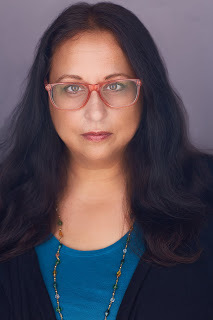
Dorian Palumbo
Hometown: Woodbridge, New Jersey
Current Town: New York, New York
Q: Tell me about Divination.
A: Divination takes place in a crystal shop somewhere down on the Jersey shore. It’s a cast of six women, and the characters some from all sorts of backgrounds and stages of life, all getting together to take a class in “Psychic Mediumship”. Each one of them is battling something personal, whether it’s disease in the family, racial attacks from the neighbors, coming out – they all need to take their power back, in some way, when they’re joined by a new classmate who’s really had life smack her in the face and needs to find her tribe. It’s about the supernatural, and psychic phenomena, and new age philosophy, but, ultimately, it’s about female friendships.
And, if I can get on a soapbox here for a second, it’s not about a bunch of women getting together to complain about how they’re treated, or not treated, by men. It has virtually nothing to do with men. This is the second of two ensemble female shows I’ve written, and not having any male characters on the stage to throw their weight around and drive plot is a very freeing experience.
Q: What else are you working on now?
A: Like a lot of writers, I have a queue of things that I’ve sketched out, and things that are half-finished – and I’m likely to ignore all of them and keep working on a screenplay I’ve just started to break story on. You have things you doodle on until something else catches fire and you get obsessed with that new thing. I can already tell this new screenplay’s going to be a big lift, because it’s a period piece and a comedy, but I don’t really care because it’s making me happy to work on it. I also plan another play that’s kind of in the research phase right now.
Q: Tell me, if you will, a story from your childhood that explains who you are as a writer or as a person.
A: When I was in sixth grade, I decided to write a play about Santa Claus. Don’t ask me what the story was – I’m old, this was probably 1972 or something, so I don’t remember – but I remember there was this kid in my class that was kind of bigger than all the other kids, and a bit awkward, and the other kids used to give him kind of a hard time, so I made him the star of my play and asked if we could rehearse it a little bit and present it to the rest of the class. Everything was going fine, and then one day when we were supposed to rehearse the play, Paul, the kid playing Santa was sick, so this other kid, called Patrick, tried to bully his way into the lead part. I let him read, and then Patrick spent an hour trying to convince me that he was better in the part, and that I should kick Paul to the curb. Well, of course Patrick was better in the part – he could read better, was way smarter, and he was a total ham. And he was also an asshole, so I said “no.”
When we did the play for the class, Paul’s Mom had made him a really cool Santa costume, and even though he couldn’t stand still and never got “off book”, he had a great time, and so did the class. And it made being at school suck just a little less for Paul, so I was happy about that.
Q: If you could change one thing about theater, what would it be?
A: I think this idea of talkbacks has to be applied a little more judiciously. I’m not going to go all Mamet or anything like that. But it’s one thing for me to do a staged reading for a room full of theatre professionals who ask incisive questions and take me to task; it’s kind of another to have some rando stand up in the audience and yell at me for putting too many curse words in my play. Yes, that really happened. If a play has controversial subject matter, like Bryony Lavery’s “Frozen”, for example, it’s perfectly appropriate to do a moderated talkback afterward with the cast if people are into it. Honestly, one of the best parts about theatre for me is having a drink afterward with a friend and talking about what we just saw, so if the show is over, I’m not hanging around to listen to strangers “process” the experience together. I’m pretty much going to the bar.
Q: Who are or were your theatrical heroes?
A: Theresa Rebeck, Samuel Beckett, Alan Bennett, Paula Vogel, Stephen Adly Guirgis, Harvey Fierstein, Thornton Wilder, Wendy Wasserstein
Q: What kind of theater excites you?
A: I love to see a really masterful actor at the top of their game, like Fiona Shaw, or Janet McTeer. Laurie Metcalf. I saw Alan Rickman a few times and was mesmerized. I once saw Jerry Ohrbach walk out onto a stage that was miles away and I could still feel that star-powered prana out in the cheap seats. And when really terrific actors are supported by an outstanding play and really artful direction, that’s the triple-threat of course. “Indecent”, for example, had me absolutely gobsmacked. But something else I really love, love most of all in theatre in fact, is when a playwright takes me into a world I’ve never peered into before – not in documentaries, not in the news – and makes me take on a perspective that’s brand new to me. Broaden my perspective without lecturing me or, god forbid, boring me, and I’m yours for life.
Q: What advice do you have for playwrights just starting out?
A: Find your trusted readers. Whenever you finish something new, you’re going to need to be able to solicit feedback from people who know how to give it. They can’t be competitive with you, they have to know the form you’re working in inside-and-out, and they have to be honest without being snarky.
I have four trusted readers in my life now, and even though two of them are personal friends, I always pay them a fee when I ask them to give me notes because, hey, we’re all broke, and we can all use a little cash now and then. Nobody’s that much of a genius that they don’t need notes. Maybe Tom Stoppard doesn’t need notes. Everybody else needs them. When you’re starting out, you’re going to get lots, so start getting used to getting them from people whose opinions you respect.
Q: Plugs, please:
A: “Divination” will be opening on Hallowe’en night, Wednesday, 10/31, 2018, at 8 PM, at the American Theatre of Actors (americantheatreofactors.org) and running Wednesdays through Saturdays at 8 PM (10/31, 11/1, 11/2, 11/3 and 11/7, 11/8, 11/8, 11/10), and Sundays (11/4 and 11/11 @ 3PM) Tickets are available at smarttix.com (https://smarttix.com/Modules/Sales/SalesMainTabsPage.aspx?SalesEventId=8348)
If you come on Sundays, we’ll have a guest Q&A from actual psychic intuitive Veronica Moya. Or you can come on the weekdays, and you come early, you might be able to get a quick Tarot card reading from me before the show. It calms my nerves.
---------------------------------------------------------------------------------------------------------
Enter Your Email To Have New Blog Posts Sent To You
-----------------------------------------------------------------------------------------------------------
Support The Blog

-----------------------------------------------------------------------------------------------------------
Mailing list to be invited to Adam's events
Email:
------------------------------------------------------------------------------------------------------------
Adam's Patreon
Adam's New Play Exchange Profile (Plays to Read)
Books by Adam (Amazon)







Published on October 31, 2018 06:28

